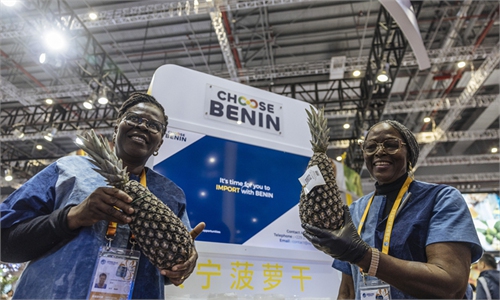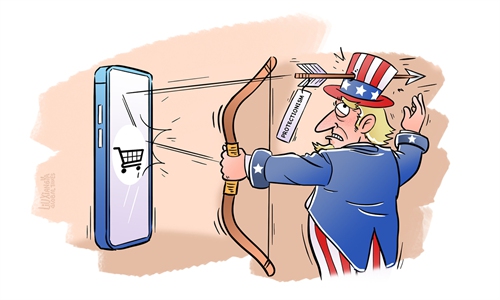
Illustration: Liu Xiangya/GT
Ahead of Black Friday and the Christmas shopping season, air freight rates for goods moving from Asia to some Western countries have surged, driven by increased demand for Chinese imports and a growing reliance on air freight due to disruption in the Red Sea, the Financial Times reported Sunday.Chinese e-commerce platforms are working to meet Western consumers' appetite for affordable goods, with many shipments being directly airlifted to customers.
In the increasingly complex global economy, the jump in air freight demand offers a clear reflection of the real landscape of today's international trade - one that is dynamic, authentic and directly connected to the everyday lives of ordinary people.
What drives the volume of air freight is the real consumption demand of Western consumers. If this demand is suppressed - specifically, if trade protectionism targets the Chinese manufacturing sector, driving up the prices of made-in-China products and pushing Western consumers to choose products from other countries - it will be ordinary people in the West who suffer the losses. Western consumers should have the right to freely choose high-quality and affordable products.
The price advantage of made-in-China products stems from the country's robust manufacturing capabilities, supported by a well-established industrial system, resilient supply chains, technological progress, skilled labor and mass production. Despite rising labor costs, Chinese manufacturers operate efficiently, enabling them to offer competitively priced products to the world.
As Christmas approaches, large chain stores in some Western countries are stocked with a wide range of made-in-China decorations, ranging from Christmas lights to gift stockings. In the consumer electronics section, there are also many made-in-China products on display. In Yiwu, East China's Zhejiang Province, you can find nearly everything related to Christmas. Known as the world's largest and most famous distribution center for Christmas supplies, Yiwu plays a key role in the global holiday market.
Of course, affordable prices do not necessarily mean poor quality. It is undeniable that products from South Asia and Southeast Asia are becoming increasingly price competitive. Against this backdrop, made-in-China products must continue to improve their quality to enhance their overall competitiveness. They have made significant progress in this area. In addition to price, high quality is a crucial factor for Western customers when choosing made-in-China products.
For example, China has raised environmental and production standards in recent years, which has further driven technological innovation among businesses, thereby improving the competitiveness of their products.
Consumers are typically most concerned with the price and quality of goods. It should be up to consumers, not protectionist trade policymakers, to decide which products to purchase. At the very least, Western consumers should have the freedom to make their own choices without interference from protectionist trade policies.
There are widespread concerns that rising trade protectionism will further affect international trade. Specifically, if more protectionist policies are implemented, the costs will ultimately be passed on to Western consumers, making them big victims of trade protectionism.
From this perspective, the recent surge in air freight demand deserves attention. A larger increase in air freight indicates stronger actual market demand for made-in-China products, which could lead to greater market distortion driven by trade protectionism. As a result, Western consumers may face more significant potential losses due to these protectionist measures.
Citing market analytics firm Xeneta, the Financial Times reported that the air freight rate from Asia to the US has surged, with the average spot price in October up 49 percent from a year earlier to $5.46 a kilogram. Rates from Asia to Europe rose 25 percent over the same period. Based on those figures, it would be unwise to pursue protectionist measures.
The author is a reporter with the Global Times. bizopinion@globaltimes.com.cn



